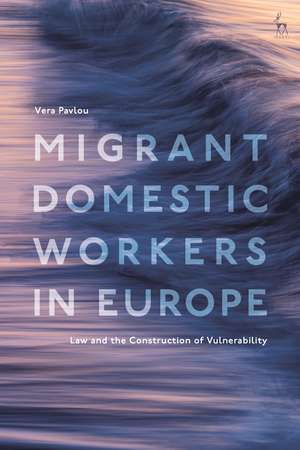Migrant Domestic Workers in Europe: Law and the Construction of Vulnerability
Autor Vera Pavlouen Limba Engleză Hardback – 15 dec 2021
| Toate formatele și edițiile | Preț | Express |
|---|---|---|
| Paperback (1) | 302.95 lei 6-8 săpt. | |
| Bloomsbury Publishing – 14 iun 2023 | 302.95 lei 6-8 săpt. | |
| Hardback (1) | 538.36 lei 6-8 săpt. | |
| Bloomsbury Publishing – 15 dec 2021 | 538.36 lei 6-8 săpt. |
Preț: 538.36 lei
Preț vechi: 772.84 lei
-30% Nou
Puncte Express: 808
Preț estimativ în valută:
103.01€ • 112.25$ • 86.81£
103.01€ • 112.25$ • 86.81£
Carte tipărită la comandă
Livrare economică 23 aprilie-07 mai
Preluare comenzi: 021 569.72.76
Specificații
ISBN-13: 9781509942374
ISBN-10: 1509942378
Pagini: 184
Dimensiuni: 156 x 234 mm
Greutate: 0.43 kg
Editura: Bloomsbury Publishing
Colecția Hart Publishing
Locul publicării:London, United Kingdom
ISBN-10: 1509942378
Pagini: 184
Dimensiuni: 156 x 234 mm
Greutate: 0.43 kg
Editura: Bloomsbury Publishing
Colecția Hart Publishing
Locul publicării:London, United Kingdom
Caracteristici
Nuanced and rigorous analysis of the multiple legal sources regulating migrant domestic labour in Europe
Notă biografică
Vera Pavlou is Lecturer in Labour Law at the University of Glasgow, UK.
Cuprins
Introduction Globalisation and Migrant Domestic Labour Migrating for Domestic Work and Vulnerability to Exploitation Framing and Contesting the Role of Law in Structuring Migrant Domestic Workers' Vulnerability Th e ILO Instruments: Potential and Limitations Migrant Domestic Labour in Europe Aims and Approach Chapter Overview Data Collection 1. Domestic Workers under National Migration Regimes Introduction Migration Regime Features as Vulnerability Vectors A Typology of European Migration Regimes on Domestic Workers Comparing the Construction of Vulnerabilities under European Migration Regimes Conclusion 2. Labour Law Regimes and Vulnerability Introduction Labour Law Regulation of Domestic Work in the UK, Cyprus, Sweden and Spain Approaches to Illegally Employed Migrant Domestic Workers Illegality Doctrines and Migrant Workers' Rights under Labour Law Conclusion 3. Migrant Domestic Workers under EU Migration Law: Fragmentation and the Value of Work Introduction EU Sources on the Movement of EU and Non-EU Workers Fragmentation, Different Hierarchies and the Value of Work: Implications for Migrant Domestic Workers Domestic Workers under EU Law Sources on the Integration of Non-EU Migrants EU Migration Law Norms on Illegally Resident Domestic Workers Conclusion 4. Using EU Labour Law Sources to Challenge Domestic Workers' Vulnerability Introduction Domestic Work and the Personal Scope of EU Labour Law Sources Substantive Rights in Selected Areas How Does National Law Fare? Conclusion 5. Challenging Vulnerability Introduction Organising Migrant Domestic Workers Processes of Reform and Avenues to Challenge Domestic Workers' Vulnerability Conclusion
Recenzii
[The book] makes a valuable contribution to the existing literature by examining how national and EU-level migration and labour laws produce the conditions in which migrant domestic workers are exploited . [The book is] highly engaging and informative.
Migrant Domestic Workers in Europe is an insightful contribution to the literature, which effectively utilises a comparative methodology to illustrate the law's exacerbation of vulnerability. Its exhortation to push towards a more inclusionary reading of EU law should be taken up as part of a toolkit to bring migrant domestic workers within the comprehensive regimes of protection that they, like all workers, deserve.
This book is a wake-up call for all who take the European value of human dignity seriously . As a community built on human rights and rule of law, 'the European way of life' for migrant workers is unenviable - one of neglect, rightlessness, abusive working conditions, insecure residence status etc. The EU legal framework presented in Pavlou's book is part of the problem. Her endeavours show it should be part of a solution.
Migrant Domestic Workers in Europe exemplifies the benefits of rigorous comparative and multiscalar socio-legal analysis for understanding how law can both constitute and transform structures of vulnerability. It will inspire researchers and activists to continue to find ways to achieve decent work for migrant domestic workers.
Through meticulous, detailed and smart comparative legal analysis, Vera Pavlou shows us the range of regime options states have - both in migration and labour law - and exposes the very rich policy toolbox available to policy makers and activists in this area.
Migrant Domestic Workers in Europe is an insightful contribution to the literature, which effectively utilises a comparative methodology to illustrate the law's exacerbation of vulnerability. Its exhortation to push towards a more inclusionary reading of EU law should be taken up as part of a toolkit to bring migrant domestic workers within the comprehensive regimes of protection that they, like all workers, deserve.
This book is a wake-up call for all who take the European value of human dignity seriously . As a community built on human rights and rule of law, 'the European way of life' for migrant workers is unenviable - one of neglect, rightlessness, abusive working conditions, insecure residence status etc. The EU legal framework presented in Pavlou's book is part of the problem. Her endeavours show it should be part of a solution.
Migrant Domestic Workers in Europe exemplifies the benefits of rigorous comparative and multiscalar socio-legal analysis for understanding how law can both constitute and transform structures of vulnerability. It will inspire researchers and activists to continue to find ways to achieve decent work for migrant domestic workers.
Through meticulous, detailed and smart comparative legal analysis, Vera Pavlou shows us the range of regime options states have - both in migration and labour law - and exposes the very rich policy toolbox available to policy makers and activists in this area.
